|
Rockson motorcycles were made in the centre of the Black Country’s chain making
capital; Cradley.
J. S. Rock & Sons Limited was
founded in 1886 by Joseph Rock, a blacksmith, to make
chains and other forge-work at his hearth in Beecher
Road, Cradley. By 1901 he had been joined by his two
sons, Albert and William who assisted him at the forge,
at a time when the business produced chains, copper
soldering irons and small items such as cotter pins and
rag bolts. The factory soon expanded and included a
chain shop with 7 chain hearths and olivers, a second
shop with more hearths, and cropping shears, a machine
shop with lathes and drills powered by a Tangye gas
engine, and a pickling and galvanising bay.
After the First World War the
company acquired a second site at Banner’s Lane in
Cradley for use as a store for war surplus items. It was
later developed into a steel and non ferrous
stockholding site. |
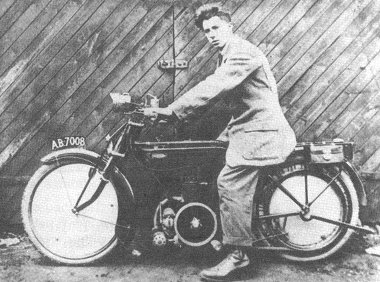
| Arthur Rock on a
1921 Rockson fitted with wheel disks. From
the collection of the late Jim Boulton. |
|
The four younger Rock brothers, Harry, Sim, Cliff,
and Arthur became interested in motorcycles and decided
to build a prototype machine as the basis for a
production model.
Much of the engineering design was carried out by the
eldest brother, Harry, and the first machines appeared
on the market in 1920. |
|
Three models were produced as
follows:
Model ‘A’
- single speed, without a clutch, kick start or
footboards. Selling price £56.14s.0d.
Model ‘B’ - two speed, with
a Burman gearbox. Selling price around £65.
Model ‘C’ - two speed, with
a Burman gearbox, hand operated clutch, and kick start.
Selling price £73.10s.0d.
Specification
All production models were powered
by a 250c.c. 2¾hp. Villiers engine, and all
demonstration models were fitted with 250c.c. Blackburn
engine. AMAC, Brown, or Barlow carburettors were used on
all machines, and models ‘B’ and ‘C’ came complete with
a 2 speed Burman gearbox. The transmission was by a
¾inch Dunlop or Pedleys belt, and Dunlop, Palmer, or
Hutchinson tyres were fitted to the standard 26inch
wheels.
Best weldless steel tube supplied
by Accles and Pollock was used for the frames which were
fabricated on site by a welder from Birmingham. The tank
had a capacity of 1¼ gallons of petrol and a ¼ gallon of
oil. Brookes or Lycetts saddles were used and the
machines were finished in black enamel, with red panels
on the tank, lined in gold.
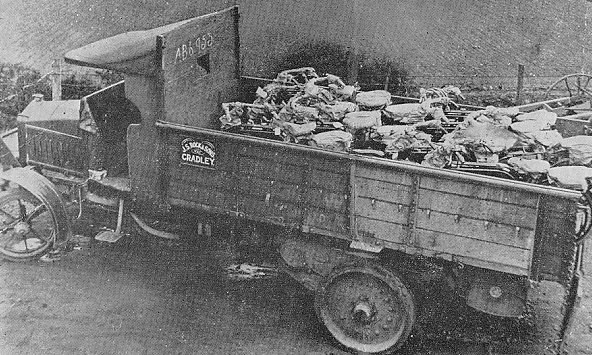
The company's lorry, about to
leave the works, complete with 8 new motorcycles. |
| The machines were assembled in three sheds at
Beecher Road which were separate from the factory. Sim
Rock oversaw the production and brother Cliff and Arthur
acted as salesmen.
Sim also road tested every production machine and
rode Rockson motorcycles in reliability trials and
competitive events. |
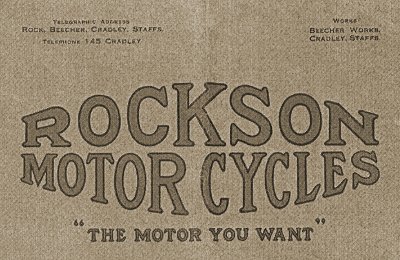
The front page of the Rockson
catalogue. |
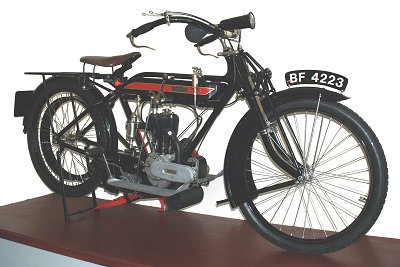
| The demonstration
model 'C' Rockson on display at the Black
Country Living Museum. |
|
Peter Barnsley wrote an article for the
Blackcountryman magazine, in which he retold Harry
Rock’s recollections of one of Sim’s competition
successes whilst riding a demonstration Rockson machine.
The 1921 road reliability trial included several
steep climbs over the Clent Hills. Sim beat the
competition and finished in first place to win a gold
medal. |
|
Around 400 Rockson machines were
produced, about half of which went to India, to fulfil
an order which is believed to have come from the British
Army.
Each of the four brothers owned a
demonstration machine, and several others may have been
built.
Sales suffered due to a slump in
the early 1920s, and by 1925 production had ended.
|
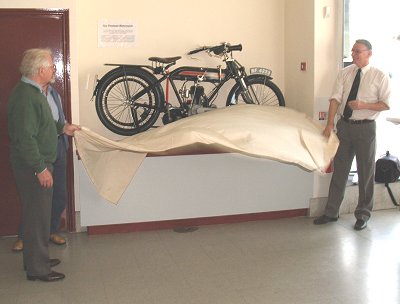
Unveiling the Rockson at the Black
Country Living Museum during the presentation ceremony
on 19th July, 2007. On the right is the Museum's
Director & Chief Executive Ian Walden. |
|
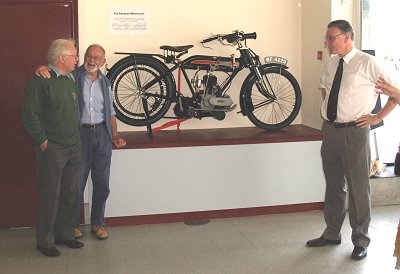
Another photograph taken at the
presentation ceremony. |
It is believed that only one complete machine
survives. This is a demonstration model ‘C’ that
possibly belonged to one of the four brothers.
It can be seen at the Black Country Living Museum,
Tipton Road, Dudley. |
|
When motorcycle production ended,
the four brothers returned to the family chain-making
business. A few years later Cliff opened a motorcycle
shop on Windmill Hill, Cradley. The shop opened in the
early 1930s and closed around the outbreak of war in
1939. In the early 1950s Cliff and his son John founded
John Rock Motorcycles in Hagley Road, Stourbridge and
continued in business until the mid 1960s. John became a
successful motorcycle scrambling rider and later
designed and built ocean-going sailing boats.
Joseph Rock died in 1944 and J. S.
Rock and Sons Limited closed in 1964. |
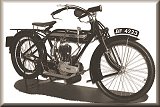 |
Return
to the
list of manufacturers |
|